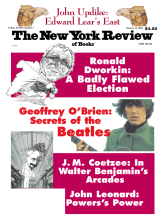The following exchange between Stanley Sheinbaum and Robert Solow took place after the publication of Robert Solow’s article “Should We Pay the Debt?” in the October 5, 2000, issue.
To Robert M. Solow:
I write at this moment with regard to your very thorough piece on the debt which takes me back to a question I have had for some time now and I would like to ask you about. I was a Keynes baby conditioned on the merits of deficit spending—at least in that kind of a depressed moment. Now, however, the thrust seems to be to generate annual surpluses and the effect of that over time—at least hypothetically—would be to reduce the national debt to zero. If indeed that were to happen would it not indicate that there would be virtually no Treasury bonds and possibly even no Treasury bills to be dealt with in the money markets? Does that not imply that the Fed would be left without their tool with which over the decades they have been able to influence the interest rates? What will Alan Greenspan do for a living? Yes, they do have the additional tool of the short-run discount rate, but my Bernard Haley and Mo Abramovitz teachings as a graduate economics student at Stanford left me with the notion that the really significant weapon for the Fed is, to repeat, their dealings with Treasury bonds.
Stanley K. Sheinbaum
Publisher
New Perspectives Quarterly
Los Angeles, California
Robert M. Solow replies:
I have two comments that will, I hope, clarify the situation. The first is that you should not forget about Keynes. The key is the difference between periods of recession and periods of boom. In recessions, the private economy is saving too much (too much to use the economy’s productive capacity); the government helps by dissaving, spending more than it takes in, and providing the needed extra demand. In a boom, especially a consumption-driven boom, care for the future might suggest that the government do some extra saving to top up the private sector’s small amount; with care it can do that gently enough not to tip the economy into recession. That’s the situation today. One of Gore’s sillier remarks was that if a recession came along, he would do whatever was necessary to preserve the surplus. Dead wrong; but in the event cooler heads would prevail.
Second, in that article I mention that driving the debt to zero would leave a lot of conservative savers looking for risk-free securities to buy. It is also true, as you say, that the Fed would find itself unable to do the traditional open-market operation in Treasury bills. So what would the Fed do? One possibility would be to buy and sell federal agency securities, mortgage-backed bonds, or even certain short-term private debt instruments. Some risk in that, but not much, and anyway who could better afford to bear it than the Fed? It would work much the same way as now. A harder problem is what would happen if there were no banks. There is some academic work on that, but I’ll just wait and see.
I hope this is of some help.
This Issue
January 11, 2001



